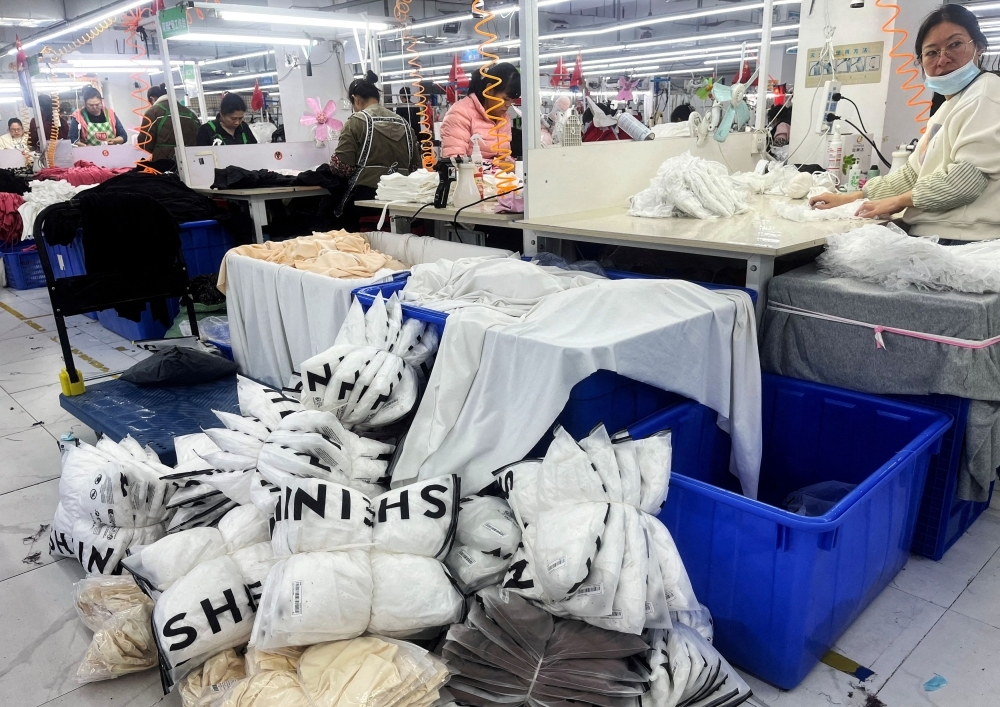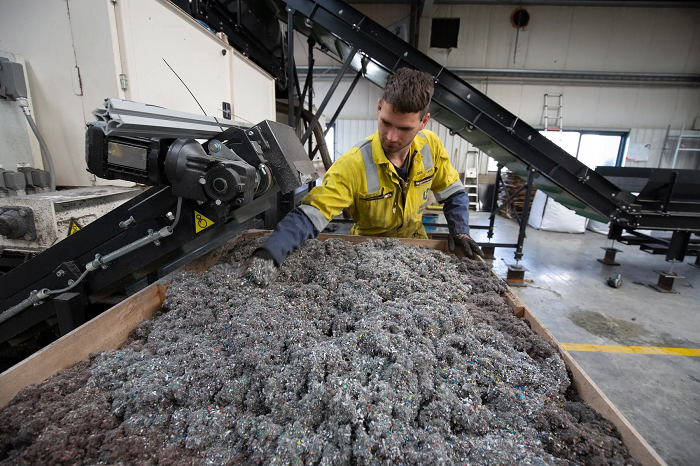FW
As per research by The NPD Group, the market for women’s jeans has registered a 9 per cent increase in sales in the year ending July 2018 compared to a year ago, Sales of the $16.4 billion US jeans market grew 5 per cent in the year ending July 2018 over same period last year. Both classic and new jean styles played an important role in growing the jeans category, particularly women’s jeans.
Skinny jeans, which have been around for quite a while, are still the number one selling women’s jeans with sales of this style increasing by 6 percent over year ago and accounting for nearly 40 percent of women’s jean sales. According to fashionistas and fashion journalists, more fashion-forward style jeans, like high-waisted, straight-leg jeans ,cropped flares, ultra-cuff, and denim sweatpants are more popular with teens and young adults.
India and Uzbekistan are looking to boost economic ties. The countries will constitute a group to conduct a feasibility study and commence negotiations for a preferential trade agreement by the end of 2018. Under a PTA, two trading partners reduce or eliminate duties on a certain number of goods traded between them.
The target is to have bilateral trade worth $1billion by 2020 and to balance the trade between the two countries by reducing the existing trade deficit. The two countries will encourage their business communities, companies and enterprises to participate in exhibitions, trade fairs, business forums and other joint business activities.
Indian universities will offer courses in tourism and hotel management in Uzbekistan. Indian companies have been encouraged to set up an IT park in Uzbekistan. To promote investments, companies and the business community will be offered incentives.
Underlining the importance of food and nutrition security, India and Uzbekistan will enhance cooperation in agriculture and allied activities by way of exchange of technology in crop production, improved water use efficiency, plant quarantine, animal husbandry, food processing and agriculture and food trade. Bilateral trade between the two countries stood at $235 million in 2017-18. It was $155.5 million in 2016-17.
Textile production in the US is set to get a boost due to the agreement signed with Canada and Mexico. The provisions will also strengthen customs enforcement and facilitate broader consultation and cooperation among the parties on issues related to textiles and the apparel trade.
If passed by all three countries, the agreement would supersede the North American Free Trade Agreement, which came into effect in 1994. Provisions of the new agreement would promote greater use of made-in-the-US fibers and yarns by limiting rules that allow for some inclusion of non-NAFTA inputs in the textile and apparel trade. The provisions require that sewing thread, pocketing fabric, narrow elastic bands and coated fabric, when incorporated in most apparel and other finished products, be made in the region for those finished products to qualify for trade benefits.
The agreement establishes a textiles chapter for North American trade, including textiles-specific verification and customs cooperation provisions, fostering new tools to strengthen customs enforcement for fraud and circumvention prevention in this sector. The US is the world's largest home textile market. The US market is projected to grow at CAGR of three per cent by 2020. The country’s imports of home textiles and made-ups grew at a robust 7.7 per cent during January-May 2018.
British fair-trade luxury knitwear brand Tengri has announced the winners of its inaugural Tengri Innovation Award, launched this year to encourage sustainable fashion and textiles working towards a more sustainable industry standard and future. The winner of the Tengri Innovation Award 2018 is designer Henrietta Johns, who explores natural animal fibres and innovative designs using traditional felting techniques to creating new fabric surfaces.
The three runners-up for the Tengri Innovation Award include: Christopher Ehrlich who was recognised for his conscientious approach to sustainability with ‘zero off-cut’ pattern cutting, reinventing a traditional tailoring technique used in the early 1900s; Cecile Tulkens for her ability to combine traditional and industrial techniques, incorporating an ancient form of crocheting originated in Belgium into her work and Zoe Atkinson, for her amour-like knitwear, combined natural materials such as leather skins, wood and soft woolen textures, to create an inventive outlook of future materiality.
The US-China trade war may damage Asia’s export-reliant economies. Tightening global liquidity could also weigh on business activity by pushing up borrowing costs, while capital outflows are also a risk. China’s economy is expected to grow 6.3 per cent in 2019, slower than its 6.4 per cent forecast in July. Though domestic consumption in China seems to be quite robust and supporting a 6.6 per cent growth this year, how the further escalation of the trade dispute will directly affect consumer sentiment is unknown. China has set a growth target of around 6.5 per cent this year.
China has started to roll out growth boosting measures as the trade war threatens to put further pressure on the already cooling economy. For Southeast Asia, moderating export growth, quickening inflation, net capital outflows and a worsening balance of payments have dimmed the outlook, with growth this year projected to slow to 5.1 per cent from the July forecast of 5.2 per cent.
However, inflation across the region is expected to remain under control, helped by country-specific factors like moderate food price inflation in India and China and fuel subsidies in Indonesia and Malaysia. Also Asian countries have enough policy space to handle shocks and pressure from currency depreciations.
Adidas, H&M, and Gap are among 12 brands and retailers to have signed the Responsible Sourcing Network’s (RSN) Turkmen Cotton Pledge, which commits companies to not source cotton from Turkmenistan until forced labor in its cotton sector has been eliminated. Other signatories include Columbia Sportswear Company, Designworks Clothing Company, M&S, Nike and VF Corporation.
As per reports, forced labor in Turkmenistan’s cotton production is already an internationally recognised concern, with the UN last year urging the country to promptly put an end to forced labor in the cotton sector. Meanwhile, in May this year, US Customs and Border Protection issued a formal ban on the import of Turkmenistan cotton or products produced in whole or in part with Turkmenistan cotton. Around 42 institutional investors have recently signed a statement urging global home goods and apparel brands and retailers to address grave human rights abuses in the cotton fields of Turkmenistan.
With trade wars and tighter credit, darkening market outlook, the International Monetary Fund (IMF) is poised to cut its forecast for global growth. Three months since predicting the world economy would grow 3.9 per cent this year and next, IMF is no longer quite so optimistic. The fund will update its World Economic Outlook on Oct. 9 ahead of opening its annual meeting in Bali, Indonesia.
While IMF acknowledged global expansion as still being the fastest in seven years, recent data suggests a cooling. Factory activity has plunged from Asia to Europe in September. The protectionist policy is turning into “actual trade barrier,” spreading uncertainty among businesses and consumers. A strengthening US dollar and tightening financial conditions have increased challenges for many emerging markets.
The IMF urged the countries to resolve their trade disputes, warning that the fracture of corporate supply chains could have “devastating” effects. The organisation has repeatedly warned that an all-out trade war could curb growth at a time when the world is enjoying the broadest upswing in years. But the US and China are not backing down, leaving no in sight to a long and bruising dispute.
Belgium hosted Euratex on September 25. The event was an opportunity for insightful conversations on one of the pressing issues in the textile and clothing industry today: the lack of skilled workforce. Programs with focus on skills are among the European Commission’s priorities for upcoming years. Companies are investing in upscaling new and current employees, via training and apprenticeships, to face the shortage of qualified experts in the sector.
Industry testimonials from different companies across Europe illustrated first-hand, diversified view of the challenges being faced by the sector in the context of skills and qualifications: from specific regional difficulties (social, political, economic) affecting different countries to common struggles.
The event also included a spotlight on European skills policies and other EU funded projects on skills development in the textile, clothing, leather and footwear sectors. WT Johnson & Sons, a historic UK textile finishers company, has been implementing personnel training, apprenticeship programs, and flexibility for its retiring workforce to encourage exchange of knowledge between older and younger generations.
The textile and clothing sector welcomed the support of public institutions and called for collaboration between stakeholders to improve its image, develop concrete tools for training, and attract and retain the younger generation.
An innovative, fashionable, and responsible range of denim was displayed by Isko, a leading ingredient brand in quality denim manufacturing, at the second edition of the Green Carpet Fashion Awards. The awards were held at Teatro alla Scala during Milan Fashion Week, on September 23, 2018 and reflected the commitment of fashion companies towards sustainable fashion.
With a unique, eco-conscious mind-set, Isko demonstrated how denim can make the difference in weaving a responsible fashion story by creating influential outfits. The brand is undertaking a new project that challenges the oxymoron ‘denim on the red carpet’. The format aims at reframing the perception of denim. Isko has taken formal denim a step forward.
All Isko products, from traditional denim fabrics to patented technologies, are created at the most advanced technological level, also using innovative and responsible fibres including organic cotton, recycled pre-consumer cotton, and post-consumer recycled polyester from PET bottles.
Indonesia aims to become one of the world's Muslim fashion centers by 2020. The strategy adopted is to boost growth of startups in this field. The country’s exports of Muslim fashion products in 2017 were up 8.7 per cent from the previous period. The country will continue to encourage Muslim fashion industrialists and designers in Indonesia to continue making innovations by increasing their productivity and strengthening their brands to be able to penetrate the export market.
At present, the Muslim fashion industry is projected to be able to absorb 1.1 million of the total 3.8 million fashion industry workers in the country. Indonesia has the largest Muslim population in the world. In addition, Indonesia is among the top five members of the Organization of Islamic State Cooperation, which is the world’s largest Muslim fashion exporter. Others are Bangladesh, Turkey, Morocco and Pakistan.
The market for Muslim fashion products is expanding. One of the drivers is the increase of Muslim population in Indonesia and the world. The value of the global Muslim fashion market is expected to reach $327 billion by 2020. Muslim consumers spend an estimated $230 billion on clothing - more than the combined clothing markets of the UK, Germany and India.












